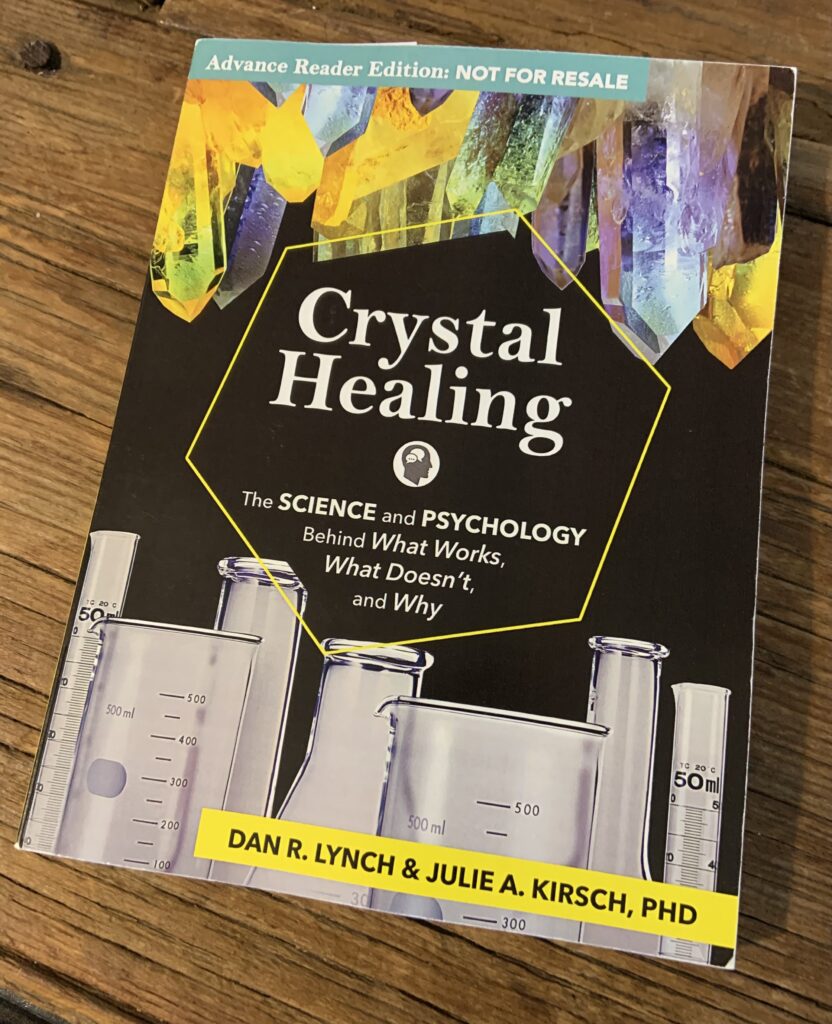This is part of an ongoing series of reviews here at GPS. These will be (to the best of my ability) spoiler-free, so as not to ruin the fiction ones I do, as well as relatively brief. I won’t just be reviewing “skeptical” works, but instead a large portion of what I read. I’m a voracious reader, even when I am swamped with other work (it’s what I tend to do instead of watch television), so I’ll probably put out one every couple of weeks. If you’re interested, I’ve actually been tracking exactly what I’ve read (book and GN-wise, anyway) for over the past four years on LibraryThing.
GPS Review: “Crystal Healing: The Science and Psychology behind What Works, What Doesn’t, and Why” by Dan R. Lynch & Julie A. Kirsch, PhD
Full disclosure: I was sent a free copy of this book from the publisher earlier this year, given that skepticism and psychology is my field of study and what I teach about.
About 20 years ago I started teaching university level courses, first as a teaching assistant in graduate school and then as a full time professor starting in 2006. Especially since beginning teaching my courses on critical thinking, I have exposed my students and been exposed myself to all manner of fantastical claims, from more innocuous ones about UFO sightings to ones with severe social ramifications, like the incorrect belief of a link between vaccines and autism. A special interest of mine, and one that my colleague Jacques and I spent three chapters on in our textbook, are claims related to health and wellness. Given how easily and quickly misinformation spreads online today, health trends with little to no supporting evidence for their claims can come and go so rapidly that you might say things like “Did Gwyneth Paltrow really tell people to stick a rock in their vagina, or did a I just have a nightmare where that happened?” One particularly long-lived health idea is that of crystal healing – the idea that certain types of rocks and minerals can have an impressive array of benefits for your health and well-being.
While I can pretty quickly discuss issues like the placebo effect or the lack of controlled studies showing any positive impact of any kind of crystal, I am not a geologist or gemologist, so my knowledge is only so deep in that area. That is why I was very interested when I was contacted by the publisher of a new book on crystal healing that promised to look into “the science and psychology” of it. And, in somewhat of a shocking turn of events compared to every other book on crystal healing I have seen, I absolutely loved this book!
One of the first things that distinguishes this book is the authors. Dan R. Lynch has published numerous books on geology and mineralogy, and comes from a family involved in the business of gemology. Julie A. Kirsh, Ph.D. is an experimental psychologist and primary care research fellow at the University of Wisconsin-Madison. Usually books about crystal healing are written by those purporting to heal people with crystals, so that was my first hint that this book might be different. The mixture of practical knowledge about gems and minerals with scientific and research was evident throughout, as well as that this was not an amateur affair, as the book was very well written and incredibly well illustrated throughout.
Content-wise, the book further distinguishes itself by being incredibly thorough and evidence-based. It begins with a great introduction to minerals and rocks, discussing how they form and how they get their shapes. As someone with a psychology background, I found a lot to enjoy in the well-presented, easy to follow style the authors use to help educate readers. Then, before hopping into the claims of crystal healing specifically, they discuss New Age metaphysical beliefs and where the idea of using crystals to “heal” comes from, providing a basis for the later examination of claims made by the purported healers.
The book then does something completely different from other books on crystal healing, and dives into a great discussion of scientific methodology, what distinguishes science from pseudoscience, and why such information is crucial in examining the claims of those hawking crystal healing. The book then spends the next two chapters using that information to help understand whether or not claims of healing properties and energy are true, really guiding the reader on how to critically examine such claims, and showing what other (psychological) explanations are more plausible to help us understand why some people seem to benefit when using crystals (and, it turns out, other kinds of folk remedies or alternative medicine).
The remainder of the book primarily focuses on specific crystals (amber, selenite, moldavite, agate, and so on), looking at what the claims of healers about that stone are, scientific information about it, and “what healers should know” which focuses on being able to tell actual specimens from fakes and knock-offs. The book concludes with sections on the problems with crystal healing (such as it profit driven, lack of evidence supporting claims, and costs to users in foregoing evidence-based healing) and a section on “Should you practice crystal healing?”
Overall, I can’t recommend this book enough to those who are interested in receiving or practicing crystal healing. It’s also a really solid introduction to critical thinking and scientific skepticism overall, as well as a nice introduction to learning about rocks and minerals. Lynch and Kirsch should be proud of this book, which will now be my go to resources when someone asks questions about crystal healing!
Order the book from Amazon and other fine booksellers!

